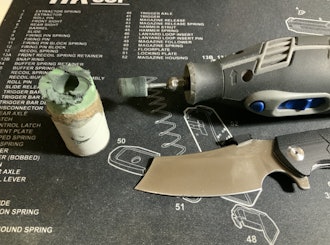Click to view our Accessibility Statement or contact us with accessibility-related questions





Breaking Through to the Next Level - Massdrop East/West: Article #23
Related Posts
BillA2021
Buy replacement quartz movement
Is an original quartz movement or a suitable substitution available for my Wenger 7900X watch at a reasonable cost, or is this not feasible I’m new at this. Thanks.
Mar 18, 2021

reswright
Basic Flip Smoothing
So you picked up a budget bearing knife as a ‘project’ knife to putter around with and you’re looking for ideas? One thing you can do is polish the bearing works, smoothing both the flip and the close action until you've got some semblance of a noiseless flick open and a smooth, gravity drop shut. This can be done many, many different ways, as many ways as there are to smooth and then polish metal; your humble narrator prefers to use a Dremel, using the following steps. I should probably make some kind of disclaimer statement here - this guide is for people already handy with a Dremel. If you’re not already handy with one it’s best not to learn how to use one while handling pocket knives or other sharp and pointy things. Hand held high RPM rotary grinding tools can be surprisingly violent if they get out of your firm grasp, they can impart an astonishing amount of kinetic energy to small sharp things you're trying to polish, sending them flying further and faster than...
Feb 6, 2021
RayF
RayF's Guide to Thanksgiving Day Watches
Please do enjoy your Thanksgiving (for those of you in countries where that means something), but please, please, please--whatever you do--don't wear either of these tacky watches while you're doing it!
Nov 26, 2020
Trending Posts in More Community Picks

Graham88
Completely surprised by the lack of blade diversity here on Drop...
I’ve been a collector of Blades since before my teens, and a retailer coming up on 15… or maybe 20 years. Drop has really been kind of an interesting experience for me, because I do occasionally get to see some unusual tech and sometimes EDC items that otherwise I might not have been aware of. And maybe it’s because I have a deep love of cutlery and bladed weapons, but I find myself trolling through the site looking at it what’s available; and it’s just it’s pretty much the same. And the bladed community here is just always confused me.. every single knife is about the same, they’re almost all drop points and although the handle materials change and brands change.. it’s really just the same knife over and over and over again... occasionally you’ll see a tanto or a slight variant; but rarely… and almost never a serrated blade. And I’m just deeply amazed at this diversion of serrated blades. And I’m just surprised there isn’t more of a request for diversity here.... and I...
Mar 12, 2020
JellyDPhoto
Can we get Sony E-Mount or other mirrorless camera options please..
Would be nice to see some Sony E mount full frame cameras on here. I currently shoot with a A99 and they killed the lense path for better or more option lenses and now is all E-Mount. 🤔
Jan 13, 2020
RayF
There Are Pandas, and Then There Are Pandas.
And this isn't either of them! The Pandas we're talking about here, are watches, not bears. And what got me thinking about them (again) was a link posted this morning by @cm.rook who pointed a few of us to the very attractive (and not terribly priced) Yema "Rallygraph" Panda which, in it's most traditional arrangement, looks like the one on the left, but can also be had in the version on the right: The model on the left is a true Panda, while the model on the right is called a reverse Panda. The reason for that distinction is clear--Panda bears, only come in the first arrangement. Now at this point, everyone should be thinking about the most well-know Panda, The Rolex Panda, which is actually a Daytona, and among Rolex Daytonas, the most famous of which is the Paul Newman Daytona, which was famous first, because it was Paul's, and second because it sold at auction for $17.8 million (US Dollars). The story of that auction is well-known so I'll only...
Nov 8, 2019







To be fair, it's easy to look at competitive Magic as a numbers game. Even the top players only win somewhere around 70% of their matches, so it makes sense to play as many tournaments as possible to give yourself the best chance of spiking a great finish. With events almost every weekend, the short-term equity is almost certainly to look for small edges in tournament preparation. But is jamming a bunch of games against the deck to beat actually making you a better player?
To make matters worse, the usual answers given for how to improve are to play more and to seek out tougher competition. These are both kind of vague concepts that present logistical obstacles that most are unable to overcome. Presumably, those who care a lot about competitive Magic are already devoting a lot of time to playing and thinking about the game, and doubling down could have significant repercussions in other areas of life. Finding players better than you to test against is also problematic in that elaborate testing networks don't just get formed overnight. There isn't necessarily a vast supply of top pros in your local area looking to mentor up-and-coming grinders. You can always find reasonable competition on Magic Online, but that's not the same as grinding out ten game sets of a key matchup. If anything, these suggestions tend to act as reassurance that you're doing the best you can with the time and resources you have available, rather than as actual solutions you can implement.
Unless you're able to find a qualified tutor to craft lesson plans and lead you through various stages of strategic development, you're going to have to rely on a lot of self-reflection and analysis. Fortunately, I think most competitive players are capable of thinking about Magic at a very high theoretical level outside of actual game play and without a judge hovering over your shoulder watching for slow play. The key is to identify situations where you might be doing something wrong and to break those down in order to develop a stronger and more accurate intuition about the game. As far as my personal game is concerned, I've identified three areas that can be addressed with post-game analysis in the hopes of improving my overall level of technical play, and I think these are probably just as relevant for others looking to get better.
Adjusting your Auto Pilot
The vast majority of in-game decisions are made very quickly without much thought. Over years of playing the game, you've developed a fairly strong intuition about basic plays and don't need to think a lot about which land to play on turn one or whether to attack with your Grizzly Bear into open mana. These parts of the game tend to feel really good as you're doing things and never really have to question whether they are right or wrong. But what if your intuition is flawed? Without some sort of self-reflection, you might play hundreds of games making the same mistake over and over again and never realize it.
Example: Top 4 of GP Mexico City (Kaladesh/Aether Revolt Team Limited)
I was playing against Andrew Cuneo after my teammates Greg O'Greenc and Stephen Neal had split their matches against Eric Froehlich and Ben Stark respectively. Andrew was on an aggressive WR and I was playing a midrange green deck. In game three, I had a land heavy draw but curved out with a mana accelerant into an Aether Herder, with more lands and a Ridgescale Tusker in hand. Andrew only had a Kari Zev, Skyship Raider and two mountains in play when he announced an attack into my newly cast 3/3. Feeling pretty good about my chances in the game, I immediately blocked his 2/1 Ragavan token, despite knowing he might have access to a Precise Strike we had seen in the draft. He would make this attack 100% of the time since I couldn't block his menace creature, and I knew his deck was capable of dealing large chunks of damage later on with falter effects like Destructive Tampering. I figured that if he had the trick, we'd still just be trading 1-for-1 and that there was a good chance that blocking would just save two points of damage. As it turns out, he had the trick and was able to use two cards to kill my follow-up Tusker while I flooded out and lost. After the game, my teammates pointed out that I did not need to risk that block since I would have had so much power and toughness on the board. If I had just attacked and made a token with my Aether Herder before playing the Tusker, it would have basically been impossible for him to win. In retrospect, this was a clear mistake that likely cost us a chance at a trophy, but is something I probably would never have noticed on my own.
Identifying these types of situations where your default intuitive play might be wrong is a little tricky. If it's possible, having a friend watch your match or review replays of your games on Magic Online would definitely help. Failing that, coverage archives are an extremely useful tool, especially for Pro Tours where the caliber of play is generally pretty high and they often have card spotters reporting the exact contents of both players’ hands. If you mute the play-by-play and step through the match, put yourself in the shoes of one of the players while hiding the contents of the other player’s hand. Try to figure out how you would play each turn and look for situations where you would have made a different decision, especially if you would have done so without much thought. These are great opportunities for learning and introspection. Even if it turns out that your play would have been better, what kinds of things could the player have been thinking about that you weren't considering? Would others good players make the same play? Did the situation warrant deeper analysis than you originally thought?
Improving Sequencing and Timing
The second type of decision is about when to do something, or in what order. These situations tend to come up several times over the course of a game and give you momentary pause. Which creature should you play on turn three? Should you kill their flyer or hold your removal spell in case they draw a bomb? Should you attack with a 2/3 into their 3/3 because you have a pump spell or pass the turn and wait for a better opportunity?
In most cases, you're able to come up with a reasonable line after thinking for a few seconds. You make a play and feel ok about it. I mean, you're playing Magic and not every decision will be obvious. You have to play at a reasonable pace and can't spend 20 minutes analyzing every possibility. Well, that might be true during the actual game, but there's no reason you can't review it afterwards and really break it down. Most people only look back at these situations if it seems like their decision might have cost them the game. Besides being results-oriented, that also misses a lot of opportunities for analysis of other plays that could have been important but didn't end up being the focal point of the game. The good news is that these situations tend to be simple enough that they can be talked about in general terms and brought up as points of discussion. You can jot down why you made the decision you did, and ask others what factors they would consider. Without the time pressure of an actual match, you can consider each factor in depth and try to incorporate these lessons into similar situations in the future.
Example: Arcbound Ravager or Steel Overseer on Turn Two
I've been playing Affinity for a while now and, for the first year or so, I would usually prioritize casting an early Steel Overseer over an Arcbound Ravager when I had both in hand. I would think about it each time, but couldn't get away from the fact that playing the Overseer first was so much more efficient in terms of damage output and generating an insurmountable board state as fast as possible. I would rationalize that it was so much better if they didn't have a removal spell and that Arcbound Ravager would still be good a turn later. I watched countless Overseers die before finally realizing that the Ravager would often draw out the removal spell anyway, and that a slightly delayed Steel Overseer would still win most games if left unchecked. While playing the Ravager first is not correct in every situation, it took me a long time to realize that it should be the rule rather than the exception. I could have figured that out a lot sooner if I had just taken some time after each match to think about the matchup and how games were likely to play out.
Modern Affinity - Jon Stern GP Las Vegas
Main Deck (60):
4 Ornithopter
2 Memnite
4 Signal Pest
4 Vault Skirge
4 Arcbound Ravager
4 Steel Overseer
3 Etched Champion
2 Master of Etherium
4 Mox Opal
4 Springleaf Drum
4 Cranial Plating
1 Welding Jar
3 Galvanic Blast
4 Darksteel Citadel
3 Blinkmoth Nexus
4 Inkmoth Nexus
3 Spire of Industry
2 Glimmervoid
1 Swamp
Sideboard (15):
1 Pithing Needle
2 Ghirapur Aether Grid
2 Thoughtseize
1 Etched Champion
1 Master of Etherium
2 Dispatch
2 Rest in Peace
2 Wear // Tear
2 Ancient Grudge
Developing Heuristics for Complicated Game States
The last type of situation I want to talk about are those huge board stalls or really complicated situations with known and unknown information that you just aren't able to fully process when they come up in an actual game. Without the luxury of 10 minutes and a pad of scrap paper, you're forced to just figure out a shortcut and make what feels like a good play, even though you know you need more time. This doesn't happen that often, but when it does, it can feel really bad, especially when you end up attacking with too many creatures, walking into an on-board trick, or tapping out when you couldn't afford to. While you might admonish yourself for not taking the time to work things out, there are other factors at play and you do need to maintain a reasonable pace. Most people walk away from these situations a little frustrated or upset and immediately try to forget about it and move on. While this might be advisable in a tournament setting where you need to recover mentally and prepare for the next match, it's a wasted opportunity if you never revisit the situation.
One of the things that separate great players from those who are merely good is an ability to process complex situations very quickly. This might seem like innate talent but is also something that can be learned. Watching an expert combo player is always a little mystifying to me. Those types of decisions don't necessarily come naturally, and I find it amazing that some can play a deck with so many intricate decisions at lightning speed. What it really comes down to, however, is developing your own personal shortcuts or heuristics for dealing with game states that are too difficult to process from scratch.
Example: Assessing the Risk of Dying to a Topdecked Cranial Plating or Arcbound Ravager
Playing against Affinity can be almost as tricky as playing it, and figuring out exactly what they can do on a given turn is a useful skill for almost any Modern player. I've gone through plenty of slow turns staring at a bunch of lands and artifacts in play, trying to figure out whether I can actually kill my opponent. Out of personal frustration, I finally sat down after a match and started working out little tricks to help calculate Arcbound Ravager math. Signal Pest counts as two since it gets to attack. The second Arcbound Ravager counts as two. With one extra mana, I can count an additional manland. With two extra, I can double count the second Inkmoth, but I need three extra to double count Blinkmoth etc. Then there are the situations where I'm killing with damage and need to factor in Master of Etherium, or when I don't know how I'm going to kill and need to decide which manland to sneak a point in with. The deck is extremely complicated to play, and I'm still working on developing a better set of heuristics. These techniques are also important for those with no intention of playing Affinity, and a good will recognize that they need to be able to figure this stuff out if it comes up in an actual game. Finding situations like these that you can develop shortcuts for will help you parse complicated situations that come up in tournament play, and reduce the number of times you feel overwhelmed by too much information. While highly complex will never really become something you can play on auto pilot, building up techniques for parsing information will help you think through more and more complicated situations and develop an ability to focus more on what’s actually important.
These three types of improvements I'm talking about all have one thing in common, which is that they are very difficult to achieve through repetition alone. Although you might recognize when a play directly costs you a game, the real goal is to find a way to train yourself to make better decisions more quickly. Speed is kind of the crux of the matter. I'm confident that I could play at an extremely high level given enough time and discipline to really think through every game situation, and I think this is true for most competitive players who find themselves on somewhat of a skill plateau. Unlocking your full potential won't necessarily be easy, but there are ways of analyzing your game that I think are more effective than just jamming as many games as possible, reading articles, and asking for advice. While I wouldn't eschew tournament preparation since that's also very important if you want to win, my advice would be that if you're actually trying to improve, you can't neglect technical play. You need to spend some time analyzing these types of situations outside of actual games in order to try to develop a deeper understanding and a stronger intuition.
I hope this article helped answer some questions about how to get better at Magic. It’s a complicated topic that I don’t think gets as much attention as it should. Thanks for reading, and please post any questions or feedback below! We had an exciting reveal of two Amonkhet masterpieces , check out the video here: https://www.massdrop.com/talk/1482/scouting-report-massdrop-east-west-on-2-amonkhet-masterpieces
If you are curious about our team, check out our intro: https://www.massdrop.com/talk/1117/announcing-team-massdrop-east-west or, read our previous weekly articles:
1. How to Prepare for an MtG Pro Tour by Ben Weitz (https://www.massdrop.com/talk/1158/how-to-prepare-for-an-mt-g-pro-tour)
2. Approaching New Magic Drafts by Ari Lax (https://www.massdrop.com/talk/1193/approaching-new-magic-drafts)
3. Constructed Testing for Pro Tour Aether Revolt by Jarvis Yu (https://www.massdrop.com/talk/1213/recap-of-constructed-testing-for-massdrop-east-west-for-pro-tour-aether-revolt)
4. Breaking into Eternal Formats - Case Study: GP Louisville by Jon Stern (https://www.massdrop.com/talk/1240/breaking-into-eternal-formats-case-study-gp-louisville-massdrop-east-west-article-4)
5. In Good Company - Top 8 at GP Vancouver by Eric Severson (https://www.massdrop.com/talk/1285/in-good-company-top-8-at-gp-vancouver)
6. Adapting to Full Block Kaladesh Limited by Jiachen Tao (https://www.massdrop.com/talk/1323/adapting-to-full-block-kaladesh-limited-massdrop-east-west-article-6)
7. Sorry My Felidar Guardian Ate My Homework by Mark Jacobson (https://www.massdrop.com/talk/1364/sorry-my-felidar-guardian-ate-my-homework-massdrop-east-west-article-7)
8. Taking a Mardu Vacation - Top 8 in New Jersey and Heading to an Eternal Extravaganza by Jarvis Yu (https://www.massdrop.com/talk/1401/taking-a-mardu-vacation-top-8-in-new-jersey-and-heading-to-an-eternal-extravaganza-massdrop-east-wes)
9. A Guide to the Grind by Pascal Maynard (https://www.massdrop.com/talk/1448/a-guide-to-the-grind-massdrop-east-west-article-9)
10. Asking Aggro-vating Questions by Timothy Wu (https://www.massdrop.com/talk/1493/asking-aggro-vating-questions-massdrop-east-west-article-10)
11. The Meat and Potatoes of Jund by Paul Dean (https://www.massdrop.com/talk/1534/the-meat-and-potatoes-of-jund)
12. Hidden Values in Magic: The Gathering for Kids and Parents by Scott Lipp (https://www.massdrop.com/talk/1572/hidden-values-in-magic-the-gathering-for-kids-and-parents-massdrop-east-west-article-12)
13. The Importance of Preparation in Competitive Magic: The Gathering by Ricky Chin (https://www.massdrop.com/talk/1606/the-importance-of-preparation-in-competitive-magic-the-gathering-massdrop-east-west-article-13)
14. How to Find Amonkhet's Star Players by Ari Lax (https://www.massdrop.com/talk/1643/how-to-find-amonkhets-star-players-massdrop-east-west-article-14)
15. Top is No Longer on Top by Jarvis Yu (https://www.massdrop.com/talk/1692/top-is-no-longer-on-top-massdrop-east-west-article-15)
16. Casual Multiplayer Fun by JC Tao (https://www.massdrop.com/talk/1731/casual-multiplayer-fun-bang-magic)
17. Monoblack Zombies at Pro Tour Amonkhet by Eric Severson (https://www.massdrop.com/talk/1764/monoblack-zombies-at-pro-tour-amonkhet)
18. To Puzzle or to Puzzleknot by Paul Dean (https://www.massdrop.com/talk/1793/to-puzzle-or-to-puzzleknot)
19. The Evolution of Vehicle Aggro Decks by Ricky Chin (https://www.massdrop.com/talk/1822/the-evolution-of-vehicle-aggro-decks-massdrop-east-west-article-19)
20. Putting down My beloved Bant Eldrazi by Ben Weitz (https://www.massdrop.com/talk/1863/putting-down-my-beloved-bant-eldrazi-massdrop-east-west-article-20)
21. Breaching into Grand Prix: Las Vegas by Scott Lipp (https://www.massdrop.com/talk/1895/breaching-into-grand-prix)
22. Tim’s Top Ten Tips for Team Trips by Timothy Wu (https://www.massdrop.com/talk/1934/tims-top-ten-tips-for-team-trios-massdrop-east-west-article-22)